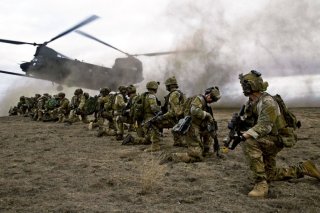It's Not All About Iraq
The legacy of that disastrous war isn’t the only reason for America’s current aversion to using force.
Last year, as the United States weighed the possibility of taking military action in Syria, it became common for some who favored intervention to refer to something they called the “Iraq syndrome.” In general, this phrase meant that as a result of the costs America had suffered during the Iraq War, the country had become allergic to using military force elsewhere, even when it was warranted. Thus, for example, William Galston wondered in the Wall Street Journal whether “acting for the wrong reasons in Iraq will prevent us from acting for the right reasons in Syria.”
This line of criticism never made all that much sense. As others pointed out at the time, the use of the word “syndrome” was a way to write off opposition to intervention as a strange pathology rather than deal with the fact that both the American public and Congress judged the case for war in Syria to be weak on its own merits.
Now, writing at Defense One, Nathan Freier makes a related argument. To his credit, he doesn’t use the term “Iraq syndrome.” Nevertheless, the thrust of his piece is similar: that the Iraq War both weakened the American military and made U.S. leaders more reticent to use force—to the country’s detriment. Here is the crux of Freier’s case:
Among world events nudging global insecurity toward new levels of danger are the tense rivalry between China and Japan, Russia’s ongoing proxy invasion of Ukraine, North Korea’s continued provocations, and the greater Middle East and South Asia’s persistent threat of contagious civil conflict. The U.S. appears paralyzed in the face of potential catastrophe, responding timidly with one arm clearly tied behind its back. In almost every case, bold collective action, including a potential show or limited use of military force, would serve to communicate resolve, reassure friends and, if necessary, compel adversaries to back down. . . . Yet, Iraq’s long shadow has made consideration of even a modest use of force unpalatable to policy elites and the public at large.
Freier is right that choosing to launch the Iraq War was a huge mistake, and that the costs of the war continue to weigh on decision makers in the White House and the Pentagon. President Obama made this explicit in his press conference in Manila earlier this week, saying that many of his critics “who were proponents of what I consider to be a disastrous decision to go into Iraq haven’t really learned the lesson of the last decade.” However, it’s far from clear that our leaders would in fact be acting all that differently in any of these situations were it not for the legacy of Iraq. Nor is it clear that if they did, the result would be to make any of those situations any better.
Freier’s claim really has two component parts: first, that the United States should be doing more to counter countries like China, Russia and North Korea; and second, that if it weren’t for the Iraq War we would already be doing more. The first assertion is difficult to evaluate because Freier doesn’t spell out exactly what he thinks we should be doing in any of these areas. At a minimum, it’s safe to say that it would be reckless in the extreme for Washington to actually use military force right now against China, Russia or North Korea—all of which are nuclear-armed powers. Below the threshold of war, there are things we could potentially do in each case—but we should have realistic expectations for what they might accomplish, and we should be careful not to trap ourselves in circumstances where we’ve made threats or promises that we can’t carry out later.
As for the second part of the claim, it’s worth considering some of the other areas around the globe in which the United States has continued to use military force. It was only three years ago, for example, that Washington acted in Libya to help topple Muammar el-Qaddafi’s government. And America’s campaign of targeted killings against Al Qaeda continues, although the pace of drone strikes has slowed. The most recent drone strike, in Yemen, took place just two weeks ago. Not to mention the war in Afghanistan, which has been going on for about twelve and a half years.
Thus, even in the aftermath of Iraq, the United States remains perfectly willing to use military force when it considers it to be worth the cost. It may not be as often as some would like. But aversion to using force elsewhere—in Syria, for example—can’t simply be written off as a malign effect of the hangover from Iraq. In that case, it also reflected the fact that, as James Joyner argued last fall, it was impossible to see how the proposed cruise-missile strikes would achieve any strategic goal or meaningfully improve the situation. This still would have been true even in the absence of the Iraq War. Iraq served as a cautionary tale for critics of intervention to point to, but the real root of their opposition was that the case for military action didn’t hold up on its own merits—a conclusion that was fully deserved.
Robert Golan-Vilella is an assistant managing editor at The National Interest. He tweets at @RGolanVilella.
Image: Flickr - The U.S. Army

